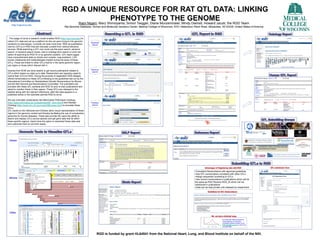
Rat QTL Data--Linking Phenotype to the Genome
- 1. RGD A UNIQUE RESOURCE FOR RAT QTL DATA: LINKING PHENOTYPE TO THE GENOME Rajni Nigam, Mary Shimoyama, Simon Twigger, Diane Munzenmaier, Mindy Dwinell, Howard Jacob; the RGD Team Rat Genome Database, Human and Molecular Genetics Center, Medical College of Wisconsin, 8701 Watertown Plank Road, Milwaukee, WI 53226, United States of America The usage of rat as a research model enables RGD (http://rgd.mcw.edu/) to collect QTL data and act as a platform for the rat users trying to link genomic Keyword variations to phenotypes. Currently we have more than 1600 rat quantitative search trait loci (QTLs) in RGD that are manually curated from various literature sources. While searching a QTL one could use the quick search, advance search, or keyword search boxes, trait or ontology term search or even the option of searching by RGD ID or by genomic position. QTL report pages have comprehensive data on strains and crosses, map positions, LOD scores, treatments and methodologies implied during the study of these QTLs. These are linked to other QTLs that lie in the same genomic region, sub region or those which interact with it. Advance Queries from NCBI are done weekly to get recent publications related to search QTLs which keeps our data up to date. Researchers are regularly urged to submit their QTLs to RGD. During the process of registration RGD assigns official nomenclature to these QTLs following to the guidelines laid out by the International Committee on Standardized Genetic Nomenclature for Mouse and the Rat Genome and Nomenclature Committee. The submitters are provided with these QTL symbols and RGD ID prior to their publications and asked to mention these in their papers. These QTLs are released to the website along with the relevant references, after this data appears in a published article or the submitter permits RGD to do so. We use controlled vocabularies like Mammalian Phenotype Ontology (http://www.informatics.jax.org/searches/MP_form.shtml) and Disease Position Ontology (http://www.nlm.nih.gov/mesh/MBrowser.html) to annotate these search QTLs. QTL tracks on the GBrowse and GViewer allow visual representation of these regions in the genomic context and thereby facilitating the use of comparative genomics for human diseases. These also provide the users the ability to search and display QTLs across species and get gene data that lie within these specific regions. Users have the option to download these data sets and customize them to suit their needs. GViewer … Advantages of Registering data with RGD QTL submission form •Consistent Nomenclature with approved guidelines •Use QTL nomenclature consistent with other QTLs GBrowse •Assign sequential numbering to QTLs •Use correct nomenclature in publications which will be the same as RGD Receive RGD_ID which can be mentioned in publications •Data can be kept private until released by researchers Guidelines for QTL Nomenclature VCMap We are just a click/call away For help with data submission, nomenclature or any other comments please contact us at RGD.Data@mcw.edu or call us at 414 456 7508 RGD is funded by grant HL64541 from the National Heart, Lung, and Blood Institute on behalf of the NIH.